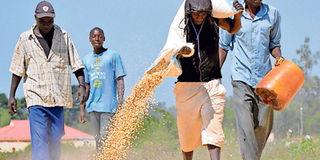Food rights group faults agriculture budgetary allocation

Agriculture and economic experts note that it may be difficult to achieve food security priority in the Big Four Agenda with the underfunding of the agriculture sector. FILE PHOTO | NMG
What you need to know:
- Kenya continues to fall short on its commitment made in the Maputo Declaration of spending 10 percent of its budget on agriculture.
- The alliance called upon Parliament to reconsider the budget, increase the allocation for agriculture and align it to the realization of food rights.
- This year’s budget allocation for agriculture is 2.53 percent of total voted expenditure, which is down from 3.5 percent in 2016/17.
An alliance seeking to realise the human right to food in Kenya has faulted the just released 2019/20 budget for not being reflective of the political prominence and commitment that food security has been given under the Big 4 Agenda.
Government spending on agriculture and food security, according to the alliance, Route to Food Initiative, remains inadequate, poorly targeted and incapable of leading to the realisation of the right to food for majority of Kenyans as enshrined in the Constitution.
“Kenya continues to fall short on its commitment made in the Maputo Declaration of spending 10 percent of its budget on agriculture. Moreover, budgetary allocations that would support the constitutional obligation to progressively realise the right to food are not evident,” said Layla Liebetrau, Route to Food Initiative’s project lead.
This year’s budget allocation for agriculture is 2.53 percent of total voted expenditure, which is down from 3.5 percent in 2016/17.
Food security coverage in the budget, according to Route to Food Initiative, is only limited to allocations to the Strategic Food Reserve, with no mention of production of food crops and economic access which entails the foods’ availability and affordability.
“It is laudable that there is an allocation for smallholder dairy commercialization. But overall, the budget statement was not responsive to the needs of Kenya’s smallholder farmers, who despite consistently producing over 70 percent of the food, are worst affected by food poverty,” said Ms Liebetrau.
While measures with key focus on large scale industrial agriculture, expanded irrigation and cash crops such as coffee, sugar, cotton and khat have been put in place, Ms Liebetrau argues that these measures lack focus on extension services, food safety and food diversity, thus undermining food and nutrition security.
“There is need to pursue a feed-thyself-first before feeding-the-market approach,” she said.
The alliance called upon Parliament to reconsider the budget, increase the allocation for agriculture and align it to the realization of food rights.
Agriculture and food security has been allocated Sh72.3billion of the Sh3trillion budget, which is touted as the biggest that the country has had since independence.




